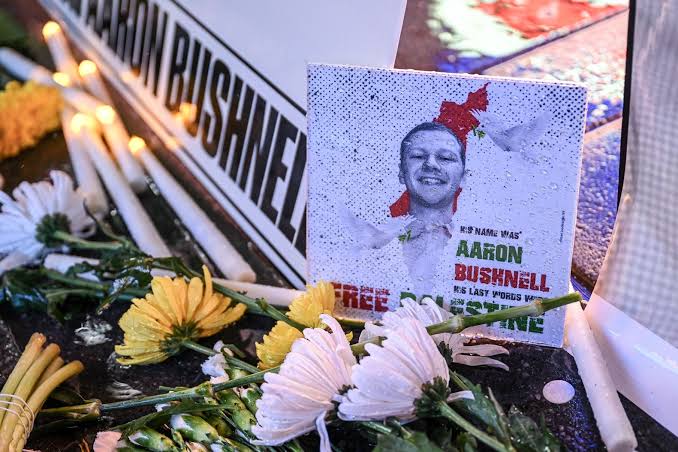
I was recalling the words of renowned Islamic scholar Yousuf al-Qaradawi regarding the self-immolation of Tunisian street vendor Mohamed Bouazizi in the context of Aaron Bushnell’s suicide, where suicide became a powerful political and ethical act in seeking social justice. How can this act be explained when it occurs in the face of genocidal states? It becomes an act of resistance, an attack, and a slap to racial states.
Qaradawi said that “These [tyrants] have caused this young man (Bouazizi) and his likes to live in a state of psychological crisis. I consider him to not have been free when he took this decision [to self-immolate]. He was boiling inside because he had earned a degree, but he could not find work. He found that he was in need of sustenance, but he could not find sustenance. As our master Abū Dharr said: ‘I am amazed at one who does not find sustenance in his house, that he does not emerge against the people wielding a sword!’ I consider him to have been in a state in which he was absolutely not in control of his will. And I said in a statement yesterday, we ask God for his sake, we humbly beseech God that He shows him clemency and forgiveness. He is Worthy of pardoning [him], Worthy of forgiving [him]. I call on the Tunisian people and I call on Muslims in general that they intercede with God to pardon this young man because he was the cause of this goodness, in awakening this Umma, in kindling this revolution. So we ask God, the Exalted, to excuse him.” I don’t want to quote Qaradawi here to say that suicide is a sacred or thing in Islam; Qaradawi himself didn’t say it. But it’s to indicate how such suicides operate in a particular political context.
In the discourse delineated, suicide transcends the realm of individual despair to assume a politicized stance against oppressive regimes or systems. It manifests as a final, desperate endeavor aimed at drawing attention to systemic injustices and instigating transformative societal change. This conceptualization underscores the symbolic potency inherent in suicide as a means of demonstrating solidarity with oppressed communities on a global scale, thereby accentuating the interconnectedness characterizing struggles against injustice worldwide.
Look into the last words of Aaron Bushnell: “My name is Aaron Bushnell and I am an active duty member of the United States Air Force. I will no longer be complicit in genocide. I’m about to engage in an extreme act of protest but, compared to what people have been experiencing in Palestine at the hands of their colonizers, it’s not extreme at all. This is what our ruling class has decided will be normal.”
When the immolation started, he uttered “free Palestine, free Palestine.” He tried to answer the questions of his inner mind, or he tried to be morally legitimated in front of himself? This is an undefinable act of resistance for someone who worked in the US force.
If we look into the notable instances such as Rohit Vemula’s suicide as an another example it also serve to elucidate systemic deficiencies and institutional biases, thereby eliciting collective societal reflection and calls for systemic reform. Consequently, suicide is reframed not solely as an individual tragedy, but rather as a searing indictment of entrenched societal inequities and injustices, hence meriting the appellation of “institutional murder.” Moreover, it represents a radical affront to prevailing norms, compelling society to confront uncomfortable truths pertaining to power dynamics and the systematic marginalization of certain demographic groups. In effect, it disrupts societal complacency and galvanizes collective action.
Approaching suicide from a moral vantage point, particularly within contexts marked by severe oppression akin to the observations made by Aaron Bushnell in Palestine, engenders nuanced ethical deliberations concerning notions of agency, suffering, and resistance. Consequently, the crisis at hand does not revolve around contemplating the fate of individuals postmortem, grounded in the belief in a just and omniscient deity, but rather revolves around the palpable inertia observed within both the personal and communal spheres of the Muslim community. The impetus to maintain the status quo prompts inquiries into the justification thereof, particularly in light of the profound ramifications of collective silence and inaction. Herein, suicide assumes the mantle of an unfathomable encounter with alterity, transcending individual suffering to encompass a collective struggle for agency and redressal.



